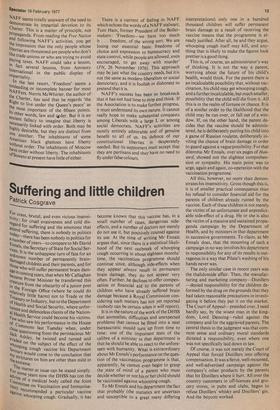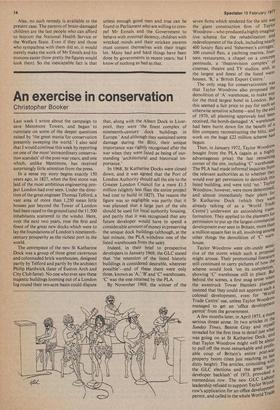Suffering and little children
Patrick Cosgrave Or eras-s, brutal, and even vicious insensiIlvtIY: for cruel evasiveness and cold dis,re,,gard for suffering and the emotions that attend suffering, there is nobody in politics tc'claY—there has been nobody in politics for acnumber of years—to compare to Mr David clrinals, the Secretary of State for Social ServIces. It is the unhappiest turn of fate for an lid,riknown number of permanently braintraged children and their parents, and for u°se. who will suffer permanent brain damla: la coming years, that when Mr Callaghan came Prime Minister he transferred this '.'reature from the obscurity of a junior post r.Aini the Foreign Office (where he could do itIvelY little harm) not to Trade or the o'f.eisurY or Industry, but to the Department nealth and Social Security, where unfortunate and defenceless clients of the Nation; Health Service could become his victims. orew,who saw his performance in the House el Commons last Tuesday when, under J ose quest i on ing from the pertinacious Mr .ack Ashley, he twisted and turned and 'wvaded on the subject of the effect of the h fciaping cough vaccine his Department „ours would come to the conclusion that he strictures on him are other than mild in "e extreme. p The Matter at issue can be stated simply. or. wc so__ Years now the DHSS has (on the advice or a medical body called the Joint ,,°mmittee on Vaccination and Immunisa_"on) recommended a particular vaccine dgainst whooping cough. Gradually, it has
become known that this vaccine has, in a small number of cases, dangerous sideeffects, and a number of doctors not merely do not use it, but positively counsel against its use. At the time of writing Mr Ennals argues that, since there is a statistical likelihood of the next outbreak of whooping cough occurring in about eighteen months' time, the vaccination programme should continue since, although side-effects when they appear always result in permanent brain damage, they do not appear very often. Further, he declines to offer compensation or financial aid to the parents of children who have already suffered brain damage because a Royal Commission considering such matters has not yet reported (nobody can be certain when it will report).
It is in the nature of the work of the DHSS that anomalies, difficulties and unexpected problems that cannot be fitted into a neat bureaucratic mould turn up from time to time: one of the important tests of the calibre of a minister in that department is that he should be able to react to the unforeseen with humanity. What is extraordinary about Mr En nals's performance on the question of the vaccination programme is that, apparently, he cannot even begin to grasp the state of mind of a parent who must decide whether or not his or her child should be vaccinated against whooping cough.
To Mr Ennals and his department the fact that probably (the statistics are uncertain and susceptible to a great many differing interpretations) only one in a hundred thousand children will suffer permanent brain damage as a result of receiving the vaccine means that the programme is already justified. After all, he and they argue, whooping cough itself may kill, and anything that is likely to make the figures look prettier is a good thing.
This is, of course, an administrator's way of thinking. It is not the way a parent, worrying about the future of his child's health, would think. For the parent there is an incalculable possibility that, without vaccination, his child may get whooping cough, and a further incalculable, but much smaller, possibility that the child will die from it. All this is in the realm of fortune or chance. It is of a similar order to the likelihood that the child may be run over, or fall out of a window. If, on the other hand, the parent decides that the vaccine should be administered, he is deliberately putting his child into a game of Russian roulette, deliberately inviting the chance of brain damage in order to guard against a vague possi bility. For that dilemma Mr Ennals, over six pages of Hansard, showed not the slightest comprehension or sympathy. His main point was to urge, again and again, co-operation with the vaccination programme.
All this, however, no more than demonstrates his insensitivity. Gross though this is, it is of smaller practical consequence than his refusal to consider financial aid for the parents of children already ruined by the vaccine. Each of these children is not merely the victim of an unfortunate and unpredictable side-effect of a drug. He or she is also the victim of a massive and sustained propaganda campaign by the Department of Health, and by ministers in that department in successive governments. To claim, as Mr Ennals does, that the mounting of such a campaign in no way involves his department in responsibility for any of its results is outrageous in a way that Pilate's washing of his hands never was.
The only similar case in recent years was the thalidomide affair. Then, the manufacturing and marketing company---Distillers —denied responsibility for the children deformed by the drug on the grounds that they had taken reasonable precautions in investigating it before they put it on the market. The Court of Appeal—presided over, I need hardly say, by the wisest man in the kingdom, Lord Denning—ruled against the company and for the aggrieved parents. The central thesis in the judgment was that common sense and ordinary moral standards dictated a responsibility, even where one was not specifically laid down in law.
Of course, it was not merely the Court of Appeal that forced Distillers into offering compensation. It was a fierce, well-mounted, and well-advertised campaign against the company's other products by the parents that hit Distillers where it hurt. All over the country customers in off-licences and grocery stores, in pubs and clubs, began to refuse Distillers' whisky and Distillers' gin. And the boycott worked. Alas, no such remedy is available in the present case. The parents of brain-damaged children are the last people who can afford to boycott the National Health Service or the Welfare State. Even if they and those who sympathise with them did so, it would merely make the work of Mr EnnaIs and his minions easier (how pretty the figures would look then). So the inescapable fact is that unless enough good men and true can be found in Parliament who are willing to compel Mr EnnaIs and the Government to behave with minimal decency, children with wrecked minds and their stricken parents must content themselves with their tragic lot. Many bad and hard things have been done by governments in recent years; but I know of nothing as bad as that.



































 Previous page
Previous page